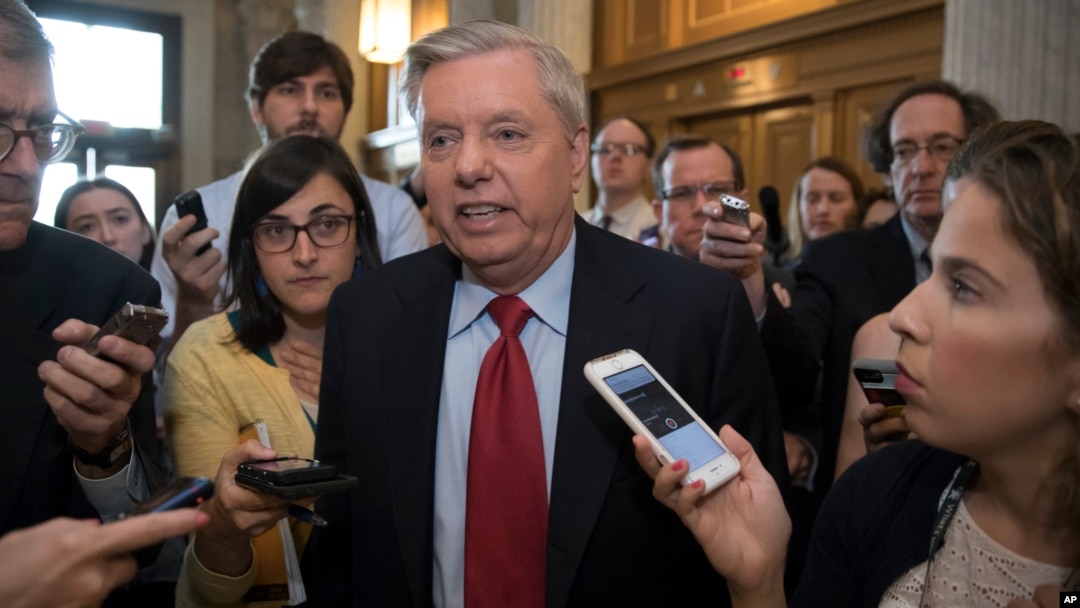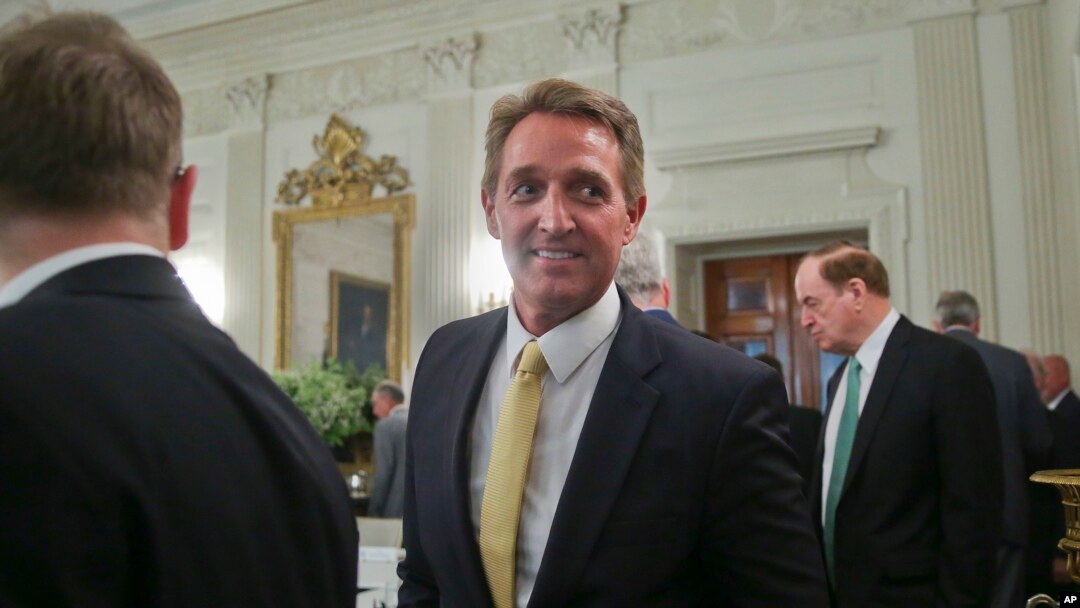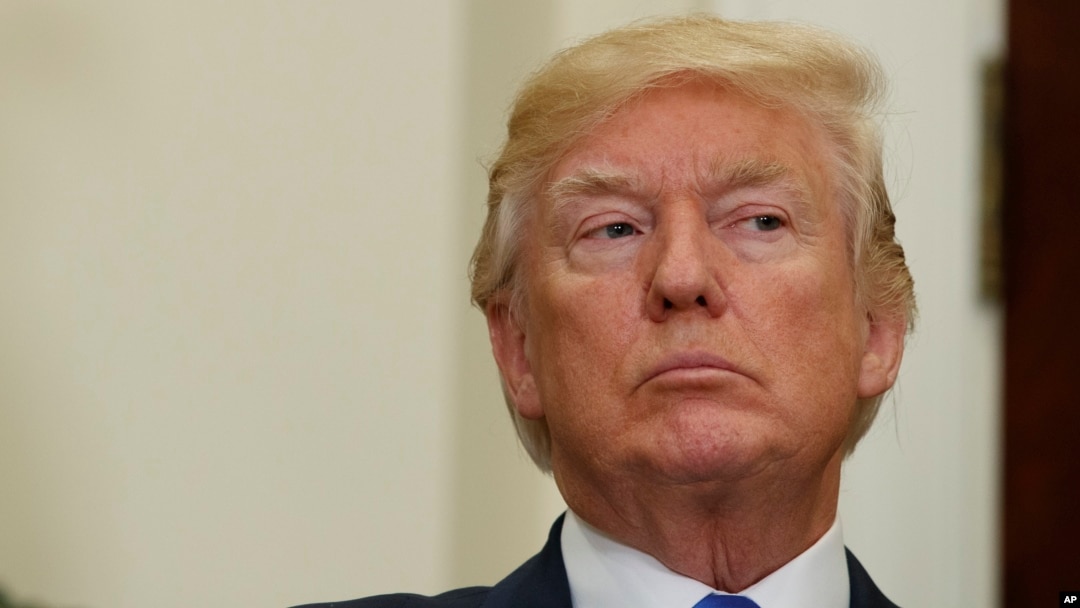A rift between the U.S. president and his own political party widened Thursday as Donald Trump publicly criticized two Republican senators, and another senator from the party questioned the president’s stability and competence.
The latest targets of the president’s wrath are Lindsey Graham of South Carolina and Jeff Flake of Arizona.

Sen. Lindsey Graham, R-S.C. is surrounded by reporters as he arrives at the Senate on Capitol Hill in Washington, July 27, 2017.
Graham, a former presidential candidate, has accused Trump of stoking civil tension with his comments on the racially motivated protests several days ago Charlottesville, Virginia.
“Publicity seeking Lindsey Graham falsely stated that I said there is moral equivalency between the KKK, neo-Nazis & white supremacists,” Trump said on the Twitter social media platform Thursday, adding that such a characterization is “a disgusting lie.”
Flake, who sits on the Senate judiciary committee, is incurring presidential wrath for writing in a recent book that Republicans abandoned their principles by surrendering to Trump’s “politics of anger.”

FILE - Sen. Jeff Flake, R-Ariz., center, walks to his seat as he attends a luncheon with other GOP senators and President Donald Trump, July 19, 2017, in the State Dinning Room of the White House in Washington.
Takes to Twitter
Trump responded on Twitter Thursday by essentially endorsing Flake’s 2018 primary election opponent, saying the incumbent is “WEAK on borders, crime and a non-factor in the Senate. He’s toxic.”
The latest outbursts on social media by the president, as he continues a working vacation at his New Jersey golf club, also included opposition to the removal of statues and other monuments honoring Confederate generals and soldiers from America’s Civil War in the 1860s.
“The president’s tweets speak for themselves,” White House spokesperson Lindsay Walters said.
For some, Trump’s tweets and recent statements speak volumes about the state of the relationship between the president and the Republican Party, founded in 1854.
Most notably, Trump finds himself increasingly isolated from the leadership of Congress, both chambers of which are controlled by the Republican Party.
Trump’s comments Tuesday, in which he said demonstrators from hate groups and counterprotesters shared blame for the Charlottesville violence, unleashed unprecedented criticism of the president by Republican lawmakers. Some admonished Trump by name. Most others released comments rejecting bigotry, though the timing of their messages indicated they were clearly responding to the president’s remarks.
U.S. Sen. Bob Corker, R-Tenn., speaks to the Chamber of Commerce in Knoxville, Tenn., Aug. 16, 2017.
‘Radical change’
Speaking to the Chattanooga Rotary Club on Thursday in his home state of Tennessee, Republican Senator Bob Corker called for “radical change” in the White House to avoid “great peril.”
“The president has not yet been able to demonstrate the stability, nor some of the competence, that he needs to demonstrate in order for him to be successful,” Corker said.
No Republican lawmakers have appeared on television to defend Trump’s stance, and there has been silence from the White House.
“The rift between the president and the GOP is unlike any other American example that I know,” Ted McAllister, associate professor of public policy at Pepperdine University, said.
The historian notes that early U.S. President John Adams — and his son, President John Quincy Adams — “had serious challenges from within their parties that prevented them from accomplishing much of anything,” and President Andrew Johnson’s experiences with Congress during Reconstruction might have some similarities, but “the parallel is not strong.”
McAllister, a frequent and prominent lecturer on American conservatism, told VOA that Trump was brought to power as a “rebel yell” by supporters who wanted an outsider, but had no third-party candidate from which to choose.
“The GOP is still run by those who believe in the old ideology from the 1980s and whose own interests are tied to the institutional matrix, the policies, the political arrangements, that had evolved during this new age of globalization,” McAllister said. “The GOP is currently incapable of abandoning those connections, and so they are constitutionally formed in such a way as to reject a rebel. Trump, meanwhile, can only connect with those who voted for him by being a rebel.”
Tied ‘at the hip’
For some analysts, there is only so far Trump and party can diverge.
“The Republican Party and President Trump remain tied together at the hip,” Atlantic Council Senior Fellow Jamie Metzl said.
“Even though Republican critiques of the president are increasing, too many Republican lawmakers remain unwilling to support the aggressive measures required to reign in America’s out-of-control president for fear of alienating their base,” Metzl, a former director for multilateral affairs on the National Security Council, told VOA. “Until this changes, America’s democracy and role in the world will increasingly be at risk.”
Some political observers contend Trump cannot and will not change, and that could lead to serious consequences for Trump, as well as the party.
“This is who Trump is, what he believes and what is natural. The more people see that, the more it shapes the picture of who Trump is,” Georgetown University Assistant Professor Hans Noel said.
The political scientist told VOA this “may have electoral consequences in the future if things continue down this road.”
Natalie Liu contributed to this report.


